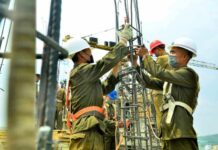Sidi Bou Zid is a city of just 40,000 people in central Tunisia. Yet a small incident occurred in this small city on December 17th of last year which has yet to stop reverberating around the world; a young man poured gasoline over himself in front of city hall and lit a match.
The young man, who lost his life despite the efforts of emergency services, was Mohamed Bouazizi. He was highly educated but unemployed, selling fruit and vegetables illegally on the street after failing to get a job coming out of university. It was when police officers confiscated his produce for a meaningless violation that he decided to protest his situation for the last time.
[imText1]
He fought for his life for 18 days, finally passing away on January 5th, 2011. It was a death which travelled quickly across the internet, and protests demanding the resignation of the president began on January 8th.
Zine el-Abidine Ben Ali, then still the president, soon declared that he would create 300,000 jobs and promised to hold early elections after dismissing his cabinet.
However, the protesters could not be soothed and Ben Ali, who had reigned for 24 years, secretly left the country on the night of January 14th. Thus, the death of one young man triggered a revolution in Tunisia. It was all over in ten days.
[imText2]
[imText3]
[imText4]
The revolution did not come out of nowhere, of course. Tunisia was struggling with chronic unemployment, corruption and inflation. Despite being one of the richer countries in Africa, the economy was too weak to accept 80,000 university graduates annually, and average wages fell well short of living costs. Elsewhere, President Ben Ali had blocked access to major websites like Youtube and Flickr, and was one of ‘World’s Top 40 Media Predators’ named by Reporters without Borders.
But the significance of the Tunisian revolution is that neither the military nor a foreign power brought down the dictator; the people stood up and did it by themselves. And it is a revolution which has already spread to neighboring countries; the people of Egypt have taken to the streets to demand the resignation of President Hosni Mubarak, another long term dictatorial incumbent, while in Yemen, thousands of angry demonstrators have been protesting the rule of 32-year President Ali Abdullah Saleh ever since he passed a constitutional amendment targeting permanent control of power.
It may not be easy, but this is a model which has a chance in North Korea as well. North Korea certainly has two ingredients; a moribund economy and an educated citizenry tired of a seemingly endless dictatorship.
However, it is true that there are big difficulties. North Korea’s leaders have no problem turning the military’s guns on the people. Also, news inside North Korea does not circulate well, and news from beyond the borders is largely blocked out, while the internet in the country is too restrictive to be of use.
And yet, some say that movements for change are even beginning to appear here. Ha Tae Kyung, the president of Open Radio for North Korea believes, “The North Korean people’s social and political consciousness has improved a lot compared to that of the past. It is not anti-Kim Jong Il but it is easy to find citizens expressing their dissatisfaction to public security agents.”
Also, Ha says, “If North Korean information comes to be known to the outside in real time due to the strengthening of the role of specialized media, pressure from the international community will increase and the North Korean regime will have no choice but to weaken the oppression. Also, if Kim Jong Il dies and that control is weakened, then revolution is not impossible.”
Therefore, the role of civic organizations is significant if North Korean citizens are to stand up by themselves. These organizations must deliver news from inside North Korea to the outside and information about the development of South Korea and the international community to the people inside North Korea via leaflets and radio broadcasts. Weakening the North Korean regime’s control on the flow of information may prove to be the cornerstone of a revolution.
Of course there is a television in Kim Jong Il’s office, and he must have witnessed the power of the unity of angry citizens. Just as the dictatorship in Tunisia collapsed thanks to the extreme sacrifice of one young man, so Kim Jong Il’s fortress can be brought crashing down with just one small crack. The end of dictatorship and corruption and the spread of democracy are the irreversible trends of our era.

















